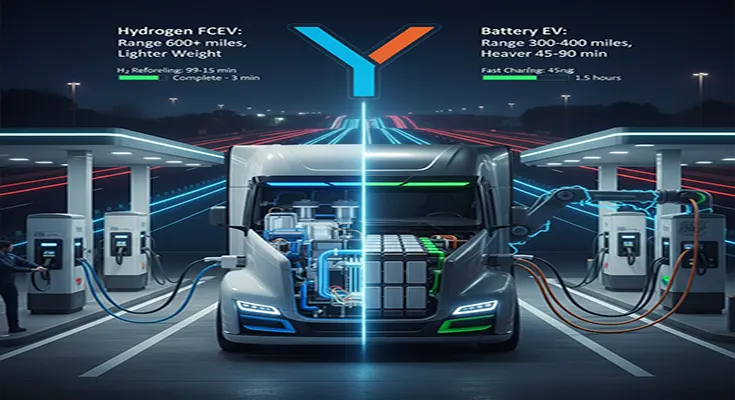The future of long-haul trucking is at a crossroads, with hydrogen fuel cell electric vehicles (FCEVs) and battery electric vehicles (BEVs) vying for dominance in the quest for zero-emission transportation.1 Both technologies offer compelling advantages over traditional diesel engines, but they also face unique challenges when it comes to the demanding world of long-distance freight.
The Case for Battery Electric Vehicles (BEVs)
Battery electric trucks are essentially scaled-up versions of their passenger car counterparts. They store energy in large battery packs that power electric motors, offering instantaneous torque and silent operation.
Pros of BEVs for Long-Haul:
- Established Technology: Battery technology is mature and rapidly improving, benefiting from decades of development in consumer electronics and passenger vehicles.2
- High Efficiency: Electric powertrains are incredibly efficient, converting a large percentage of electrical energy into mechanical energy.3
- Infrastructure Growth: Charging infrastructure is expanding, with more public and private charging stations becoming available.4
- Lower Maintenance: Fewer moving parts compared to internal combustion engines often translate to lower maintenance costs.5
Cons of BEVs for Long-Haul:
- Range Anxiety & Weight: The biggest hurdle for long-haul BEVs is the size and weight of their battery packs. To achieve sufficient range (500+ miles), enormous batteries are required, which cut into payload capacity and increase vehicle weight, potentially impacting regulatory limits and operational costs.
- Charging Time: Fast charging for massive truck batteries still takes significant time, impacting route efficiency and driver hours. Depot charging overnight is feasible, but en-route fast charging for unexpected stops or quick turnarounds remains a challenge.
- Infrastructure Demand: While growing, the electrical grid infrastructure needed to support widespread, rapid charging of an entire fleet of long-haul trucks is immense and requires substantial upgrades.
- Performance Degradation: Battery performance can degrade in extreme temperatures, affecting range and charging speeds.6
The Case for Hydrogen Fuel Cell Electric Vehicles (FCEVs)
Hydrogen fuel cell trucks generate electricity on board by combining hydrogen and oxygen, with water vapor as the only emission.7 This electricity then powers electric motors, similar to a BEV.
Pros of FCEVs for Long-Haul:
- Longer Range, Lighter Weight: FCEVs can achieve comparable or even superior range to diesel trucks with significantly lighter “fuel tanks” (hydrogen storage tanks) than equivalent BEV battery packs.8 This preserves payload capacity, a critical factor for profitability in trucking.
- Fast Refueling: Refueling a hydrogen fuel cell truck can take as little as 10-15 minutes, mirroring the speed of diesel refueling and minimizing downtime for drivers.
- Grid Independence (Relatively): While hydrogen production requires electricity, the refueling process itself doesn’t put direct strain on the electrical grid at the point of use, offering a different infrastructure challenge but potentially less localized demand.
- Consistent Performance: Fuel cells are generally less affected by ambient temperatures than batteries, maintaining consistent performance in varying climates.9
Cons of FCEVs for Long-Haul:
- Hydrogen Production & Cost: Producing “green” hydrogen (using renewable energy) is still more expensive and energy-intensive than generating electricity for batteries. “Gray” hydrogen, produced from natural gas, defeats much of the environmental benefit.10
- Infrastructure Scarcity: Hydrogen refueling infrastructure is nascent, with very few public heavy-duty hydrogen stations available globally. Building out a widespread network is a monumental task.
- Storage Challenges: Storing hydrogen, especially in its gaseous form, requires robust, high-pressure tanks.11 Liquid hydrogen storage is an alternative but also has its own complexities and energy costs.
- Fuel Cell Durability: While improving, the long-term durability and cost of fuel cell stacks under the strenuous conditions of long-haul trucking are still areas of ongoing development.
The Hybrid Approach and the Future
It’s entirely possible that both technologies will find their niche. BEVs might be ideal for shorter regional hauls, “last-mile” delivery, and routes with reliable depot charging.12 FCEVs, with their faster refueling and lighter weight for long ranges, could become the preferred solution for truly long-haul, cross-country routes where maximizing payload and minimizing downtime are paramount.
Some manufacturers are even exploring hybrid solutions that combine smaller battery packs with fuel cells, offering the best of both worlds – regenerative braking capabilities from the battery and extended range from the fuel cell.
The race is on, and the next decade will likely see significant advancements and investments in both battery and hydrogen technologies as the trucking industry navigates its path towards a sustainable, zero-emission future. The ultimate winner will be determined by a complex interplay of technological maturity, infrastructure development, operational economics, and regulatory support.

